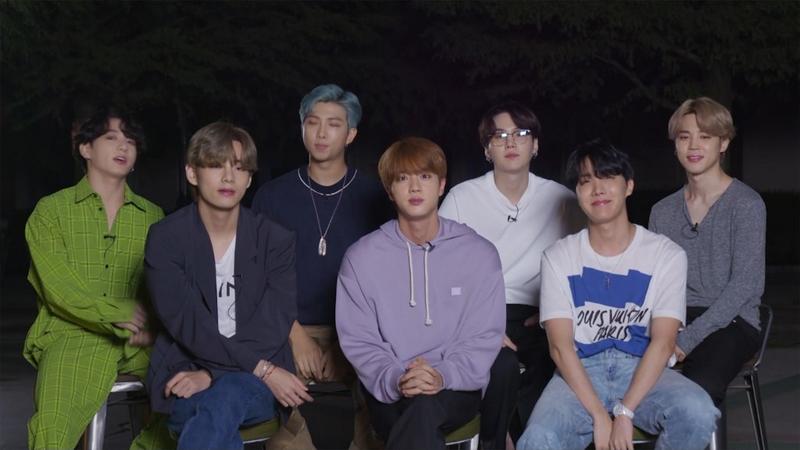 This handout image released by MTV on Aug 30, 2020, shows South Korean boy band BTS accepting the award for Best Pop for "On" from South Korea during the 2020 MTV Video Music Awards, being held virtually amid the coronavirus pandemic, broadcast in New York. (PHOTO / MTV / AFP)
This handout image released by MTV on Aug 30, 2020, shows South Korean boy band BTS accepting the award for Best Pop for "On" from South Korea during the 2020 MTV Video Music Awards, being held virtually amid the coronavirus pandemic, broadcast in New York. (PHOTO / MTV / AFP)
After blowing up the charts with Dynamite, the first English song from South Korean boy band BTS, Big Hit Entertainment Co is having another moment.
BTS officially debuted in 2013 with its single album 2 Cool 4 Skool and gained global attention when it grabbed the Top Social Artist award at the 2017 Billboard Music Awards
This time, it’s with an initial public offering that is giving the company a market value of about US$4 billion. The country’s largest listing in years took just hours for underwriters to find buyers for the available stock and priced on Monday at the top end of a marketed range. That’s even after COVID-19 forced BTS to cancel its world tour, and despite the risk that some of its stars may have to do military service.
“It seems reasonable to go for the higher price as the prospect for next year's results seems positive,” said Sung Jun-won, an analyst at Shinhan Investment Corp. “Album sales have gone up in the absence of concerts, and BTS is at the center of the ongoing popularity.”
The offering is making Big Hit founder Bang Si-hyuk worth US$1.4 billion, according to the Bloomberg Billionaires Index. The seven band members, all in their 20’s, are also getting about US$8 million stakes after Bang gave each of them 68,385 shares in August.
ALSO READ: BTS scores a first for K-pop band on Billboard chart with 'Dynamite'
Bang, 48, owns 43 percent of the Seoul-based music agency, while gaming company Netmarble Corp holds 25 percent after investing US$172 million two years ago. Netmarble’s founder, Bang Jun-hyuk, a relative of Big Hit’s Bang, is already one of South Korea’s richest people.
Big Hit declined to comment.
Bang, also known as “Hitman,” founded Big Hit in 2005 after a successful career as a music producer at JYP Entertainment Corp. Initially, the business was so quiet that artists stopped by the office just to play tennis matches on the company’s Nintendo Wii, Bang said in a 2017 Bloomberg interview. After almost going bankrupt, Big Hit’s first breakthrough came in 2009, when its 8Eight’s Without a Heart became a local hit.
BTS officially debuted in 2013 with its single album 2 Cool 4 Skool and gained global attention when it grabbed the Top Social Artist award at the 2017 Billboard Music Awards. Dynamite became the No 1 song on the Billboard Hot 100 chart when it debuted in August and was the first Asian act to top the US ranking since Kyu Sakamoto’s Sukiyaki in 1963. The band’s rise is often attributed to an effective use of social media and legions of fans obsessively devoted to the band, known collectively as the Army. BTS generated more than 97 percent of Big Hit’s sales last year and almost 88 percent in the first half of 2020, the IPO filing showed.
 This Sept 18, 2020, photo shows an advertisement for South Korean boy band BTS in Seoul. (SEONGJOON CHO / BLOOMBERG)
This Sept 18, 2020, photo shows an advertisement for South Korean boy band BTS in Seoul. (SEONGJOON CHO / BLOOMBERG)
“I get questions about how BTS has become so successful, and I’m curious too,” Bang said in a local TV show in 2018. “I didn’t imagine a future like now when I first planned BTS. The goal then wasn’t to make them as top artists.”
The coronavirus pandemic has dealt a blow to the broader music industry, with live concerts and performances canceled or postponed due to social-distancing restrictions put in place to prevent the virus from spreading.
But BTS churned out chart-topping songs and performances on shows such as the MTV Video Music Awards. The band managed to raise tens of millions of dollars by hosting a live streaming concert that drew 756,000 viewers around the globe to its own fan communication platform. Big Hit also set up content-based business models, with the group featuring in a Netmarble game and Samsung Electronics Co releasing a BTS edition for its Galaxy S20 smartphone series.
Big Hit’s revenue slid just 8 percent in the six months through June to 294 billion won (US$251 million), with concerts accounting for less than 1 percent of sales, compared with a third last year, according to the IPO filing.
The pandemic remains a concern, though. A worsening or prolonging of the health crisis could be negative for the company’s business plans or earnings, Big Hit warned in its prospectus.
The agency’s heavy reliance on BTS could also become a drawback, especially as its members still have to serve mandatory conscription to the country’s military -- all South Korean male citizens between 18 and 28 have to for about two years. BTS’s oldest member, Jin, may be able to postpone his national service until the end of 2021, and a proposed bill this month could pave the way for pop artists to delay it until they’re 30.
READ MORE: BTS' fans match group's US$1m donation to Black Lives Matter
For now, Big Hit is seeking to expand its portfolio by striking deals with other agencies and developing new talent. It acquired K-pop group management company Pledis Entertainment earlier this year and aims to launch a new group through a joint venture with CJ ENM Co. A new girl band will debut next year, the agency said.
“When the virus started, it was thought to be a crisis because they had to cancel almost everything that was scheduled. But it’s no longer considered as a crisis,” Shinhan’s Sung said. “Big Hit has showed that it can still make profits through online concerts and album sales without physical tours and concerts.”



